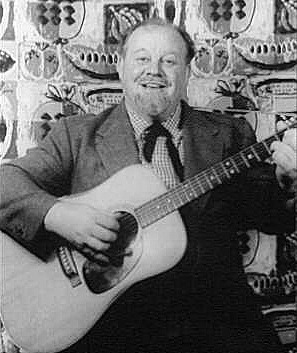Introduction
Burl Ives (1909 – 1995) was an American entertainer, with a career that spanned in over sixty years. He expanded his talent into in many forms of media, with a wide range. He was an itinerant folk singer before becoming a radio personality during the 1940s, appearing on his own radio show The Wayfarin’ Stranger. Also during that decade, Ives also began to appear in movies with Smoky, and acted more frequently from the 1950s-1960s on films such as East Of Eden, Cat On A Hot Tin Roof, Desire Under The Elms, Wind Across The Everglades, Day Of The Outlaw, and The Big Country, the last film where his performance won him an Oscar best supporting actor in 1958. He had also appeared on Broadway since the late 1930s. As a singer and recording artist, Ives released singles that endeared to his folk and country fans such as “Riders in the Sky,” “A Little Bitty Tear,” “Funny Way of Laughin’,” “Call Me Mr. In-Between,” “Mary Ann Regrets” and a lot more, and had issued 40-plus albums in his long career. He also popularized the traditional songs “Foggy, Foggy Dew” in the 1940s, and became somewhat a symbol of Christmas through his popular songs “A Holly Jolly Christmas” and “Silver and Gold” which became standard holiday fares. With his grandfatherly image he was also popular among younger listeners through some of his records such as Animal Fair: Songs for Children, Children’s Favorites, Burl Ives Sings Little White Duck and Other Children’s Favorites and Chim Chim Cheree and other Children’s Favorites, among others. A famous pipe-smoker, he died in 1995 from oral cancer, aged 85.
The early life of Burl Ives
Beloved American actor, writer and folk singer Burl Ives was born Burl Icle Ivanhoe Ives on June 14, 1909 in Jasper County, Illinois. His family saw musical talent in him when he was still young that made his uncle to invite him at the old soldier’s reunion in Hunt City where he sang “Barbara Allen.” Ives attended Eastern Illinois State Teachers College (now Eastern Illinois University), but eventually dropped out. But despite being a high school dropout, Ives’ alma mater named one of school buildings after him over half a century later.
In 1929, Ives cut a trial recording of the song “Behind the Clouds” for Richmond, Indiana-based label Gennett, but it was later rejected and destroyed. In the early 1930’s, he became a roving singer across the U.S. while doing some odd jobs. However, he started to be a regular performer on the Indiana-based radio WBOW and went back to school as well, attending the State Teachers College and at the prestigious Juilliard School in New York in the late 1930’s.
Ives’ acting and singing career
Ives hosted his own radio show in 1940 which was named after one of his songs, The Wayfaring Strangers. There, he was linked with the New York-based folk group the Almanacs. Since the Almanacs were active in the American Peace Mobilization, along with Ives, they recorded several songs in favor of the American involvement in the Second World War. In 1942, Ives served the US Army where he was ranked as a corporal. By the time he spent his army years at several posts in New Jersey and New York, he also made a film This is the Army.
After being discharged in 1943 (supposedly for medical grounds), Ives relocated to California for a while and later to New York where he worked for CBS. He starred as the singing cowboy in the film Smoky. The following year, he worked successfully with the singing group Andrew Sisters for the song “The Blue Tail Fly.” Ives had his first hit in 1948, remaking the 17th century English song “Lavender Blue.” The song was featured in the 1949 film So Dear to My Heart which earned him a nomination at the Academy Awards for Best Original Song.
Ives had been on a roll in the 1950’s with his acting career. He appeared on numerous films like East of Eden (1955), Desire Under the Elms (1958), Cat on a Hot Tin Roof (1958) and Wind Across the Everglades (1958) where he was awarded as the Best Supporting Actor by the Academy. In the next decade, it was Ives’ music career started to do him well at this point. Signed to Decca Records, he released records that would become a string of hits such as “Riders in the Sky” (#21 pop, #8 country, 1949), “Funny Way of Laughin'” (#10 pop, #9 country, 1962), “Call Me Mr. In-Between” (#19 pop, #3 country), “Mary Ann Regrets” #39 pop, #12 country, 1962) and “A Little Bit of Tear” which was Ives’ biggest hit. Written by Hank Cochran, the song ranked at #9, #1 and #2 on the Billboard Hot 100, adult contemporary and country charts respectively. In the mid-1960’s, Ives also popularized several Christmas standards like “A Holly Jolly Christmas” and “Silver and Gold” which became staples during the season through the years. Even though hits dried up for Ives during in the mid 60’s music era, he continued to perform actively both in his acting and recording career.
From Ives’ early years of his musical career, he also issued several recordings for children such as Songs for Children (1949), Mother Goose Songs (1949), Children’s Favorites (1956), Burl Ives Sings Little White Duck and Other Children’s Favorites (1959), and Chim Chim Cheree and Other Children’s Favorites (1964) etc.
Ives’ death
In 1994, Ives was diagnosed with oral cancer due to excessive pipe smoking. He had undergone several operations which were all failures. He died at his home in Anacortes, Washington on April 14, 1995, aged 85.

